As Ever A Happening Year but with many Negative Shades still Promising A Bright Future Ahead
SLOWDOWN
It was a year of turbulence for India Inc and the economy. While many sectors like realty, textiles plunged into darkness on the back of a global recession, there was a ray of hope in some other sectors like the telecom. The year also saw India’s biggest corporate fraud, falling earnings, stock market crash, job losses and soaring food prices which hit the common man. However, towards the end of the year, the economy started showing signs of recovery.
The stimulus packages started giving results with the economy growing by 7.9 per cent in the second quarter of this fiscal, the highest growth in six quarters. The Indian economy is likely to grow between 7 per cent and 7.5 per cent during the current financial year despite poor performance of the agriculture sector due to drought and floods. India’s exports and industrial growth have also turned around raising hopes of a better year ahead.

Slowdown or Not
SATYAM SCAM
The year 2009 began on a shocking note with Satyam founder Ramalinga Raju admitting to siphoning off over Rs 7,000 crore (Rs 70 billion) from the company. It was the biggest corporate fraud in India. The Central Bureau of Investigation (CBI) has now pegged the Satyam fraud at Rs 14,000 crore (Rs 140 billion) instead of the Rs 7,800 crore (Rs 78 billion) that Raju had admitted to in January this year. Satyam Computer Services was founded by Raju in 1987. The crisis-hit company has been taken over by the Mahindra group and renamed Mahindra Satyam. Vineet Nayyar is the chairman of Mahindra Satyam.

- Satyams ill famed Directror Raju Ramlingam
Raju, who turned 55 on September 15, has been in jail since January, 9. Raju is now being treated at the Nizam’s Institute of Medical Sciences (NIMS). He was earlier diagnosed with Hepatitis C and heart ailments. Raju’s brother B Rama Raju, chief financial officer Vadlamani Srinivas, three other employees of Satyam and two auditors are also in jail. They have been charged with cheating, forgery and criminal conspiracy.
INFLATION SWINGS GOLD , FOOD PRICES
The food prices in India hit a 10-year high of 20 per cent for the year till December 5, due to demand-supply mismatch and worst monsoon in 37 years, which affected the kharif crop output. India’s annual rate of inflation, based on wholesale prices, rose sharply to 4.78 per cent in November from 1.34 per cent in the previous month, mainly on account of a 16.71 per cent jump in prices of food articles. Rising prices of food items, jet fuel and alcohol pushed up inflation to 5.64 per cent in January 2009.
In June, inflation in India turned negative 1.61 for the first time in 32 years but the prices of food items like fruit and vegetables, cereals and oil were still higher than last year.
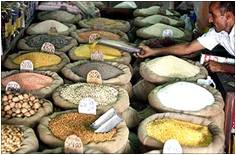
A Grocery Shop Selling Pulses - Prices hit by Inflation
Meanwhile, the food inflation decreased to soften to 18.65 per cent for the week ended December 12, though essential items like potato and pulses continued to remain expensive. Potato prices have zoomed by 136 per cent and pulses by over 40 per cent in the last one year.
MONTHLY INFLATION FIGURES
From now on, India will present inflation figures on a monthly basis instead of the existing weekly system. Analysts say since weekly data on wholesale price index-based inflation do not adequately capture the movement of prices of manufactured goods, government has to often revise the figures later.
GOLD PRICES ZOOM
Gold prices closed at all-time record of over Rs 18,000-per ten gram in November 2009 on the back of a strong marriage season demand, positive global cues and a weaker dollar. Gold touched a all-time high of Rs 18,550 per 10 gm. Gold prices rose by 13 per cent since the beginning of this November after the Reserve Bank of India announced it had bought 200 tonnes of bullion from the International Monetary Fund. Retail investment demand for gold has zoomed by 515.8 per cent to 109 tonnes in the second quarter (April-June) of 2009 from 17.7 tonnes in the first quarter. India consumes nearly 30 per cent of the world’s annual gold production. This is slated to increase by 36 per cent to 980 tonnes by 2010 according to the Indian Chamber of Commerce.
UNION BUDGET 2009 – 10
Stating that ‘aam aadmi’ is the focus of all the government programmes, Finance Minister Pranab Mukherjee proposed the following measures in Union Budget 2009-10
- Personal income tax exemption limit for senior citizens raised by Rs 15,000.
- The exemption limit for income tax for women raised by Rs 10,000 to Rs 190,000.
- For all others, exemption limit raised by Rs 10,000 from Rs 150,000.
- No change in corporate tax.
- IT returns to be made simpler.
- Fringe Benefit Tax abolished.
- Minimum Alternate Tax on book profits increased to 15 per cent from 10 per cent.
- Commodities Transaction Tax abolished.
- 100 per cent tax deduction for donations for electoral funds to improve transparency in political funding.
One of the biggest taxation reforms in India — the Goods and Service Tax (GST) — is all set to integrate state economies and boost overall growth.
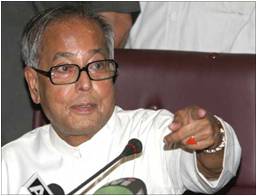
Union Minister for Finance during Budget Speech
GST will create a single, unified Indian market to make the economy stronger. Pranab Mukherjee while presenting the Budget on July 6, 2009, said that GST would come into effect from April 2010.
DIVESTMENT – A GREAT MONEY SPINNER
Divestment is the government’s mantra to earn big bucks at a time when the country is feeling the ill-effects of the global financial crisis. Now that the Left parties are not a part of the United Progressive Alliance-II, the government has put divestment of public sector units on the fast track.
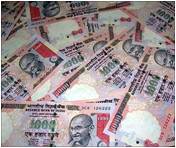
Disinvestment -- A Money Spinner
The Centre is likely to prepare a blueprint for its divestment process for the next two years by the end of this financial year. At present, there are 61 unlisted profit-making public sector undertakings and 10 listed PSUs where the government could look to dilute its stake. It plans to raise over Rs 25,000 crore (Rs 250 billion) in 2009-10, which will help to cut down fiscal deficit and the expansion of public sector enterprises.
THE SPECTRUM SAGA
The much awaited auction of spectrum for 3G mobile services is likely to be delayed by more than a month and may commence from the first week of March next year. The schedule will be announced soon. The revised schedule is being worked out taking into account the outcome of last meeting of an Empowered Group of Ministers where defense ministry agreed to vacate spectrum.
Meanwhile, the spectrum row, termed as independent India’s largest financial scam, is centered on the allocation of scarce 2G spectrum at throwaway prices. Accusing Union Telecom Minister A Raja of orchestrating a Rs 60,000 crore (Rs 600 billion) scam, the opposition parties — Bharatiya Janata Party and Communist Party of India (Marxist) had asked the government to fire the minister and institute probe into the alleged irregularities.
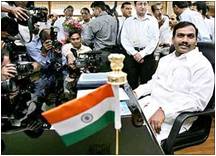
Union Telecommunication Minister A. Raja
The government had in 2007 recommended an ‘open license regime’. ‘Applications for telecom licenses were invited setting Oct 1, 2007, as the deadline. An artificial cut-off date, Sep 25, 2007, was created and applications received between Sep 25 and Oct 1 were summarily rejected. Rules of the game were changed after the game had begun,’ the BJP charged. The BJP alleged that ‘all friendly applicants, mostly real estate companies, had been advised to put in their applications before Sep 25’.
The licences and the spectrum allocation were then allotted to nine operators at a price of Rs 1,650 crore (Rs 16.50 billion) per operator. This price was not taken on the basis of the 2007 market value but on the basis of an auction held in 2001. The value of the licence and spectrum in 2007 could not be the same as in 2001 as the telecom market has grown phenomenally during this period. However, Prime Minister Manmohan Singh said allegations about the scam were incorrect. The prime minister had earlier expressed his reservations about inducting A Raja in the Cabinet.
MERGERS & ACQUISITION’S
Making strong inroads in the global acquisition arena, Indian companies continued to win big ticket deals and acquisitions.
BHARTI – MTN DEAL
This year Bharti Airtel was all set to take over South Africa’s MTN. It would have been India’s biggest-ever M&A deal but months later, the talks failed and the $23 billion deal was called off.
WIPRO BUYS YARDLEY’S ASIA BIZ

Wipro buys Yardley's Asia biz
In a $45.5 million (Rs 215 crore) deal, Wipro took over 229-year-old British brand Yardley’s business in select markets including India from UK’s Lornamead Group to stretch its personal care portfolio to the premium range.
LUPIN BUYS PHILIPPINES DRUG FIRM
Drug maker Lupin acquired Multicare Pharmaceuticals Philippines Inc. for an undisclosed sum in March 2009. This is Lupin’s sixth acquisition in 18 months.
ONGC BUYS IMPERIAL ENERGY
The Oil and Natural Gas Corp took control of Imperial Energy Plc for $2.8 billion, in January 2009, after an overwhelming 96.8 per cent of London-listed firm’s total shareholders accepted its takeover offer.
MEGA INFRASTRUCTURE PROJECTS

Bandra-Worli_Sea-Bridge
BANDRA – WORLI SEA LINK
An engineering marvel and the first-ever open sea bridge of its kind, the Bandra-Worli Sea Link is one of the most complex and advanced construction projects ever to have been undertaken in India. The Rs 1,634-crore (Rs 16.34 billion) project of the Maharashtra State Road Development Corporation has been executed by the private engineering and construction major, Hindustan Construction Company.
DELHI METRO
Delhi Metro made further progress when a brand-new train chugged into the satellite city of Noida for the first time paving the way for thousands of commuters in east Delhi and adjoining areas to enjoy the new age transport system. The Noida corridor, built at a cost of Rs 630 crore (Rs 6.30 billion), is completely elevated and will be integrated with the existing 34.3 km Yamuna Bank-Dwarka Sector-9 segment, extending the total length of Line-3 to 47.4 km.
AIRPORTS
The state-of-the-art integrated terminal, called T3, of Indira Gandhi International Airport in New Delhi is poised to be the world’s second-largest, after Beijing in China, in terms of size. The terminal, built at a cost of Rs 8,996 crore (Rs 89.96 billion), has four boarding piers with 48 boarding gates and 78 aerobridges, which is the highest for a terminal of its size.
LONGEST FLYOVER
India’s longest flyover with a length of 11.66 km was opened in Hyderabad in October. The flyover was built over a period of about three years at a cost of Rs 600 crore (Rs 6 billion), using the latest technology of prefabricated segment and overhead grid launcher, causing minimal disruption to the traffic along the route.
INDIAN AUTO SECTOR BOOMS
It is raining cars in India. The passenger car sales in India soared 61 per cent in November on the back of improved consumer sentiment, easier finance and low sales base, according to the Society of Indian Automobile Manufacturers (Siam).
Auto companies sold 1,33,687 cars in November compared to 83,121 units in the same month last year. About 40 new car models were launched in the market over the past year. India has now become the second-largest maker of small cars, overtaking Brazil.

Nano Car from House of TATA
The world’s cheapest cars, the Tata Nano was launched in March this year. In two months, the Tatas received over 203,000 fully paid bookings amounting to nearly Rs 2,500 crore (Rs 25 billion).
BAJAJ BIDS FAREWELL TO SCOOTERS
Three months from now, Bajaj will bid farewell to scooters. From selling over a 100,000 units every month, the company now manufactures only 1,000 scooters. Bajaj Auto which revolutionized the nation’s scooter market said it will stop production of Kristal by end of the current fiscal.
AIRLINES HIT BY TURBULENCE
It was a year of losses and strikes for the airline industry. The combined losses of all airlines in 2008-09 were over Rs 8,000 crore (Rs 80 billion). The operations of Jet Airways and Air India were hit for several days as their pilots went on strike in September to protests against a cut in performance-linked incentives.
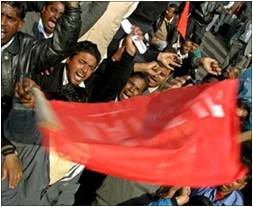
- Striking Air India Employees
A drop in traffic, revenues, high fuel costs further added to their woes. According to the International Air Transport Association (IATA), the Indian aviation industry, which accounts for two percent of air traffic worldwide, accounts for 11 percent of global losses.
Jet Airways, Air India, Kingfisher Airlines and low-cost carriers are now planning to hike air fares by up to 25 per cent in January.
THE RISE AND FALL OF MARKETS
The Sensex created history when it crossed the 21K-mark in January 2008, however, a year later it crashed. In January 2009, the Sensex saw its biggest intra-day fall when it hit a low of 15,332, down 2,273 points. However, it recovered losses to some extent and closed at a loss of 875 points at 16,730 on Januray 22, 2009. On December 29, the Sensex rose by 0.24 per cent to its highest close at 17,401 in 19 months on December 29.
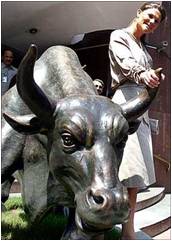
Sweden's Crown Princess Victoria poses with Bull -- Probably feeling Bullish on India
On May 18, 2009, the Sensex surged 2110.79 points from the previous closing of 12174.42 this leading to the suspension of trade for the whole day. The Sensex is expected to trade at a historical average P/E of 15 by the end of the financial 2010-11 as foreign and domestic equity analysts expect India Inc’s net profit to grow 25-30 per cent in 2010-11.
FAKE CURRENCY
The government has admitted that the problem of fake currency was ‘alarming and dangerous’ as some groups are trying to destabilize the Indian economy by injecting massive doses of counterfeit notes in the country. The secret template India uses to print currency notes has been ‘compromised’ and that is possibly why fake but real-looking Indian currency notes are being pumped in, the Central Bureau of Investigation said.
The CBI, the nodal agency for checking fake notes, has now formed a special team comprising its sleuths and officials from the Directorate of Revenue Intelligence, the Reserve Bank of India and the Central Forensic Science Laboratory to find out how and at what level the design got ‘compromised’. According to the CBI, the counterfeiters have deep knowledge about the kind of special ink, paper and other ingredients that go into the making of notes.
PLASTIC NOTES
The Reserve Bank of India is toying with the idea of replacing paper currency with polymer notes. As a pilot project, the central bank is said to have decided to introduce 100 crore (1 billion) pieces of Rs 10 polymer notes, for which the bank has floated a global tender. The bank has asked interested parties for 500 pieces of sample banknotes, before the actual global bids for the project go through.
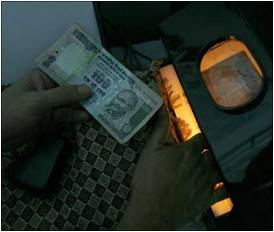
Teller Machine Counting Currency Notes-- INR
THE COPENHAGEN SUMMIT
On December 7, officials from 192 countries attended the world’s biggest summit on climate in Copenhagen to tackle the challenges of climate change. However, the Copenhagen climate talks failed to deliver a legally binding agreement to tackle global warming. Countries like India, Brazil, China, and South Africa joined hands with President Obama to form the Copenhagen Accord.
The accord commits to cut greenhouse gas emission in each country but the Accord is not yet a legally binding treaty and failure to achieve emission reductions will not be penalized
“Climate change cannot be addressed by perpetuating the poverty of the developing countries,” Prime Minister Manmohan Singh had said. Environment Minister Jairam Ramesh told Parliament recently that the country would reduce its ‘carbon intensity’ — the amount of carbon dioxide emitted for each unit of gross domestic product — by up to 25 per cent from 2005 to 2020.
Climate change and environmental degradation will force as many as one billion people to migrate over the next four decades to Southeast Asia, central America and parts of west Africa.

Mumbai Traffic came to a Standstill following Heavy Rains
GREAT YEAR FOR TELECOM
The telecom sector continued to ring louder in 2009. The economic slowdown did not hamper its growth. The telephone subscribers were a happy lot with a number of new mobile operators, like Tata DoCoMo, Unitech Wireless, MTS and STel, making a foray into the booming market. The intense competition led to a tariff war, with operators offering tariffs on per second basis. There was drop in roaming and STD tariffs as well. The mobile subscriber base grew from 346 million in December 2008 to 506 million by November 2009. However, the much-awaited introduction of Mobile Number Portability and third generation (3G) mobile services has been delayed.
CRACKDOWN ON CELLPHONES WITHOUT IMEI CODE
The telecom ministry disconnected mobile phones without the IMEI (International Mobile Equipment Identity) code. Concerned over the threat to national security, the Department of Telecom had asked operators to crack down on illegal and China-made cheap handsets, which do not bear any IMEI code. It is estimated that there are about 25 million handsets without IMEI number. Delhi Police have seized over 3,500 mobile phones without unique identity numbers, mainly imported from China.

Telcom Sector Boom
DUBAI CRISIS
The glittering Dubai image took a beating in 2009. The Dubai government’s announcement seeking a six-month reprieve on debt repayments sent shockwaves through the world markets, as it raised doubts over the Gulf emirate’s ability to meet its financial obligations. The Dubai government requested the creditors of Dubai World (one of three conglomerates that are backed by the emirate), to agree to a ‘standstill’ on repayments until May 30 2010.
The Dubai crisis is likely to hit exports, remittance, banking and real estate sector in India. Exports are going to be the most affected, as the UAE is now India’s largest export hotspot.
Bullion trading in Dubai is likely to be affected. The financial crisis in Dubai will not affect India but may prompt investors to take a relook at emerging markets, according to World Bank President Robert Zoellick. Indians who constituted 42.3 per cent of the UAE’s labour force in 2008 are also likely to be affected with several jobs being slashed.

Burj Tower, Dubai
NILEKANI, MURTHY IN NEW ROLE
Infosys co-founder Nandan Nilekani quit Infosys to head the government’s ambitious unique identification project (UID). Nilekani said he would start issuing the unique number by February 2011. Stating that it was a huge challenge to make sure that there is no duplication. Biometrics will be used to prevent duplication. The project estimated to cost around Rs 30,000 crore (Rs 300 billion) will offer identity card to all citizens.
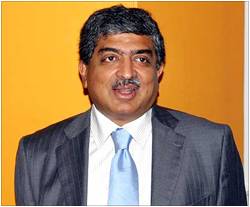
Nandan Nilekani
MURTHY TURNS VENTURE CAPITALIST
N R Narayana Murthy now wants to help budding entrepreneurs. He has initiated the first step towards starting a venture capital fund focussed on India. The fund will encourage and support young entrepreneurs who have brilliant business ideas. The Infosys chairman offloaded 800,000 shares from his personal holding, to raise about Rs 177 crore (Rs 1.77 billion) a few days ago to start Catamaran Venture fund. The fund will primarily invest in India, though it might consider investing overseas on a ‘case-to-case basis’.
AMBANI WARS
The Ambani brothers continued to hog the limelight in 2009. Even four years after splitting the Reliance Empire, the Ambani brothers still seem to be washing dirty linen in public: the latest battle is over gas pricing. Mukesh and Anil Ambani are at loggerheads again over a gas-supply agreement that was made when the Dhirubhai Ambani-founded Reliance group was split in 2005. The gas sale master agreement between Reliance Industries Ltd and Reliance Natural Resources Ltd states that the latter (RNRL) is entitled to be supplied 28 million cubic metres of gas a day from the Krishna-Godavari (KG) basin at a price of $2.34 per million British thermal unit (mBtu) for a period of 17 years.
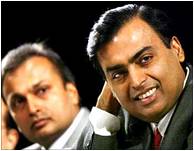
- Mukesh and Anil Ambani in Happier Times
Accusing RIL of using of delaying gas supply to the power projects of ADA Group and NTPC by a minimum of four years, RNRL said: “RIL is selling 40 million cubic meters of gas per day committed to NTPC and RNRL to third parties at $4.20 mmBtu and making super normal profit of over Rs 20,000 crore (Rs 200 billion), being the difference between $4.20 mmBtu and $ 2.34 mmBtu.
If you go by the NTPC draft agreement which the RNRL says is the template agreement for the supply of gas then there exists a clause that the price of the gas is subject to the government approval,” RIL’s counsel Harish Salve said.
Meanwhile, the government counsel said the issues involved were not between two parties. Gas from the Krishna-Godavari (K-G) basin was a natural resource belonging to the government. As the custodian of public interest, the government has asked the empowered group of ministers to fix an equitable price and it was doing so with the help of experts. The price of gas and other vital matters cannot be the subject of the fight between two persons.
—–Always Yours as Usual—-Saurabh
Note: The info has been posted for academic use only. This has no commercial value. Specially hosted for consumption of students so as to remain updated of major events and their Impact on markets. I acknowledge the portal Rediff.com and other media for source.



















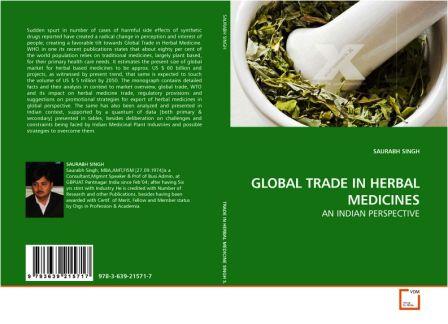







Impressions of Visitor & Few Replies